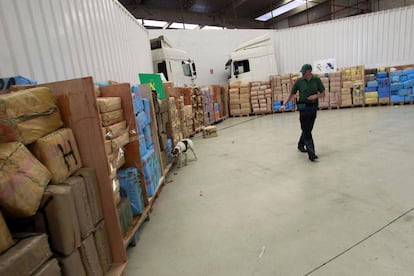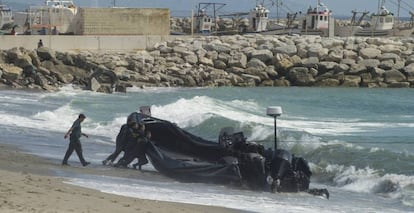How drug gangs in southern Spain are increasingly crossing the line
Traffickers in La Línea are becoming bolder, attacking police officers who try to seize their hauls

“There had to be a gutter somewhere, and it looks like they chose La Línea.” Juan Franco, the mayor of the town, speaks these words with a combination of weariness, anger and sadness. His mood can be summed up by three events that made news headlines in under 24 hours.
First, on Tuesday afternoon, 20 masked individuals stormed the ER at the local hospital and “rescued” a drug trafficker who’d been taken there by the police following a car chase. At 8am the next morning, 10 people were arrested, but not before assaulting the police officers who had caught them unloading a hashish shipment. Also on Wednesday, two Civil Guard officers were injured after a four-wheel-drive vehicle used by a drug gang deliberately slammed into their patrol car.
What’s next, attacking the police precinct?
Francisco Mena, Nexos
Franco, who is a member of the local political party La Línea 100x100, refuses to describe this as a lawless town. But Francisco Mena, a coordinator at Nexos, an umbrella group for anti-drug associations, puts it clearly: “The principle of authority has already been lost; this simply confirms it. It is simultaneously a scandal and a source of shame. So what’s next, attacking the police precinct?”
La Línea has long been a perfect breeding ground for drug trafficking: it borders Gibraltar, Morocco is a short distance away across the Strait, and the unemployment rate is 33% in a city of 63,278 souls.
Until recently, however, the principle of authority had been respected: in a constant game of cat and mouse, traffickers always admitted defeat once they were caught red-handed, dropping their haul and fleeing the scene. But things started to change last year. In April 2017, a mob of around 100 people hurled sticks and stones at the officers who were attempting to stop a hashish delivery at El Tonelero beach.

It was not the first time that happened, but since then, drug gangs have been routinely using this and other methods to fight law enforcement. In annual reports dating back to 2015, the counter-narcotics attorney’s office in Cádiz has been warning about a worrisome rise in the use of violence by these gangs.
One of the methods involves driving several stolen four-wheel drive vehicles to transport the drug, and using one of them specifically to ram into patrol cars that might come their way. Equipment seized during successful raids shows a growing number of weapons, and an increased willingness by gang members to use them.
Against this backdrop, around 5,000 local residents staged a public protest after a policeman died on duty on June 8 of last year. He had been chasing a tobacco smuggler who caused an accident that resulted in the officer’s death.
There had to be a gutter somewhere, and it looks like they chose La Línea
Mayor Juan Franco
With residents, unions and civil society groups demanding action, the Spanish government has appeared to take notice. Around 150 members of the Civil Guard and National Police were sent to the area, as Interior Minister Juan Ignacio Zoido explained on Wednesday of this week when he was forced to make a statement about the hospital raid. He called it “an exceptional case.”
“He forgot to mention that all those reinforcements left when the trouble in Catalonia began,” notes Mena.
The tension subsided, simmering under the surface until early 2018. But now the aggressive attitude is back “and growing,” as the mayor admits.
The issue has taken on political overtones. Minister Zoido, of the Popular Party (PP), noted that “the Civil Guard seized 202 tons of hashish over the last year, 20% more than the previous year.” But Andalusian premier Susana Díaz, of the Socialist Party, retorted that “drug traffickers have free rein” in the area known as Campo de Gibraltar.
Hospital case
The police are still looking for the drug trafficker who was carried off from the hospital and the masked men who helped him get away. The government delegate in Andalusia, Antonio Sanz, said that the only suspect arrested so far will be brought before a court on Friday.
Their gang, Los Castañitas, is known to local officers because it controls much of the hash that comes in across the Strait of Gibraltar, and because of its aggressive methods.

Sanz is asking the Andalusian government to create a “Special Commissioner” in La Línea to deal with this issue. The central government representative said that 80% of responsibility over the problems affecting the area falls to regional authorities because of the system of devolved powers in fields such as education, employment, training, housing, transportation and communications.
But Mena, of the Nexos federation, feels that this political confrontation is sterile. “They need to stop fighting and start working together, and it is up to the central government to make the first moves.”
“Law enforcement agencies are doing an incredible job, and I really appreciate it, but it’s not enough. We need more resources,” adds Mayor Franco. Police unions agree, and are asking for specialized units and more equipment, including four-wheel drive vehicles of their own.
Mena also wants to see courts specializing in drug crimes, and a ban on “narco-boats,” state-of-the-art speedboats with several outboard motors attached to them. “In short, what is needed is powerful action that will restore respect for the authorities.”
In the meantime, few people in La Línea would deny that social harmony is being eroded. After the hospital incident, the mayor is afraid that citizens – until now left largely alone by the drug gangs – might be at risk as well.
And there is another, less obvious risk, notes Mena: “When you project this kind of image, what doctor or police officer is going to want to come work here?”
English version by Susana Urra.
Tu suscripción se está usando en otro dispositivo
¿Quieres añadir otro usuario a tu suscripción?
Si continúas leyendo en este dispositivo, no se podrá leer en el otro.
FlechaTu suscripción se está usando en otro dispositivo y solo puedes acceder a EL PAÍS desde un dispositivo a la vez.
Si quieres compartir tu cuenta, cambia tu suscripción a la modalidad Premium, así podrás añadir otro usuario. Cada uno accederá con su propia cuenta de email, lo que os permitirá personalizar vuestra experiencia en EL PAÍS.
¿Tienes una suscripción de empresa? Accede aquí para contratar más cuentas.
En el caso de no saber quién está usando tu cuenta, te recomendamos cambiar tu contraseña aquí.
Si decides continuar compartiendo tu cuenta, este mensaje se mostrará en tu dispositivo y en el de la otra persona que está usando tu cuenta de forma indefinida, afectando a tu experiencia de lectura. Puedes consultar aquí los términos y condiciones de la suscripción digital.









































